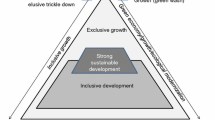Abstract
This symposium makes a first step in bridging the emerging eco-social debate and the established political science theories and concepts, indicating the mutually beneficial analytical perspectives and common research pathways that may arise. In addition to identifying several aspects in the policy, politics and polity dimensions that appear to be particularly relevant in view of the emerging eco-social policies, this collection of articles points out two cross-cutting themes, namely the transformation of the welfare state set-ups, and new cleavages and power relations, which pose new questions and open a promising research agenda for political scientists.
Similar content being viewed by others
References
Domorenok, E., and P. Trein. 2023. Policy integration and the eco-social debate in political analysis. European Political Science 23(1). https://doi.org/10.1057/s41304-023-00459-0
Fritz, M., and D. Eversberg. 2023. Mentalities, classes and the four lines of conflict in the social-ecological transformation. European Political Science 23(1). https://doi.org/10.1057/s41304-023-00457-2
Gough, I. 2016. Welfare states and environmental states: A comparative analysis. Environmental Politics 25 (1): 24–47.
Gravey, V., and A.J. Jordan. 2020. Policy dismantling at EU level: Reaching the limits of ‘an ever-closer ecological union’? Public Administration 98 (2): 349–362.
Graziano, P. 2023. The Politics of EU Eco-Social Policies. European Political Science 23(1). https://doi.org/10.1057/s41304-023-00455-4
Hall, P. 1993. ‘Policy paradigms, social learning, and the state: The case of economic policymaking in Britain’, Comparative Politics, 275–296.
Lindblom, C. 1989. The science of muddling through. Readings in Managerial Psychology 4: 117–131.
Pollex, J., and A. Lenschow. 2020. Many faces of dismantling: Hiding policy change in non-legislative acts in EU environmental policy. Journal of European Public Policy 27 (1): 20–40.
Sabato, S., and M. Mandelli. 2023. Towards an EU framework for a just transition: welfare policies and politics for the socio-ecological transition. European Political Science 23(1). https://doi.org/10.1057/s41304-023-00458-1
Zimmermann, K., and P. Graziano. 2020. Mapping different worlds of eco-welfare states. Sustainability 12 (5): 1819.
Zimmermann, K. 2023. ‘Varieties of green transitions’? Comparative welfare state research and the social dimension of green transitions. European Political Science 23(1). https://doi.org/10.1057/s41304-023-00456-3
Author information
Authors and Affiliations
Corresponding author
Additional information
Publisher's Note
Springer Nature remains neutral with regard to jurisdictional claims in published maps and institutional affiliations.
Rights and permissions
Springer Nature or its licensor (e.g. a society or other partner) holds exclusive rights to this article under a publishing agreement with the author(s) or other rightsholder(s); author self-archiving of the accepted manuscript version of this article is solely governed by the terms of such publishing agreement and applicable law.
About this article
Cite this article
Cotta, B., Domorenok, E. Conclusion: bringing together the eco-social debate and established political science perspectives: synergies and new research pathways. Eur Polit Sci 23, 80–85 (2024). https://doi.org/10.1057/s41304-023-00454-5
Accepted:
Published:
Issue Date:
DOI: https://doi.org/10.1057/s41304-023-00454-5




